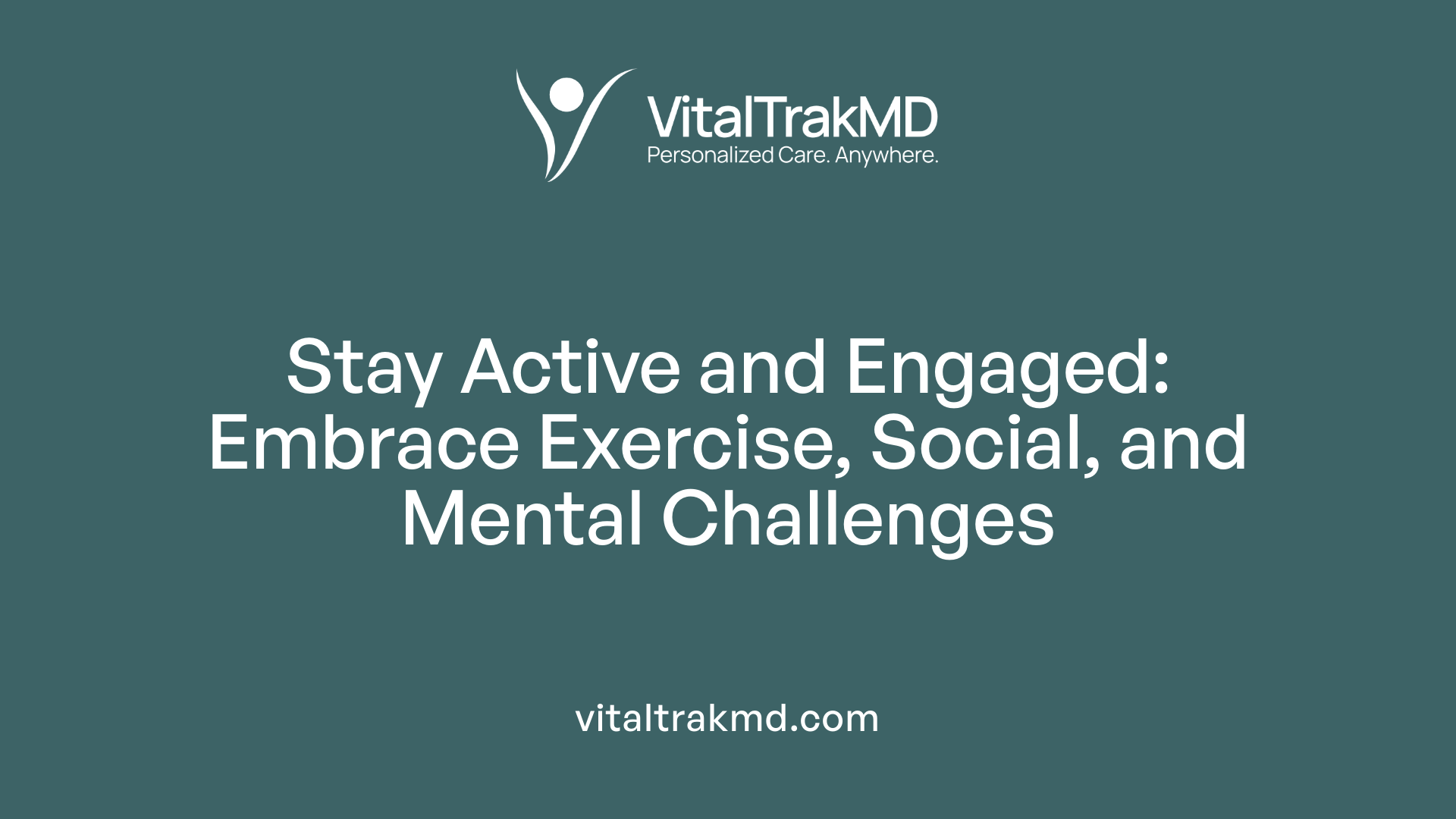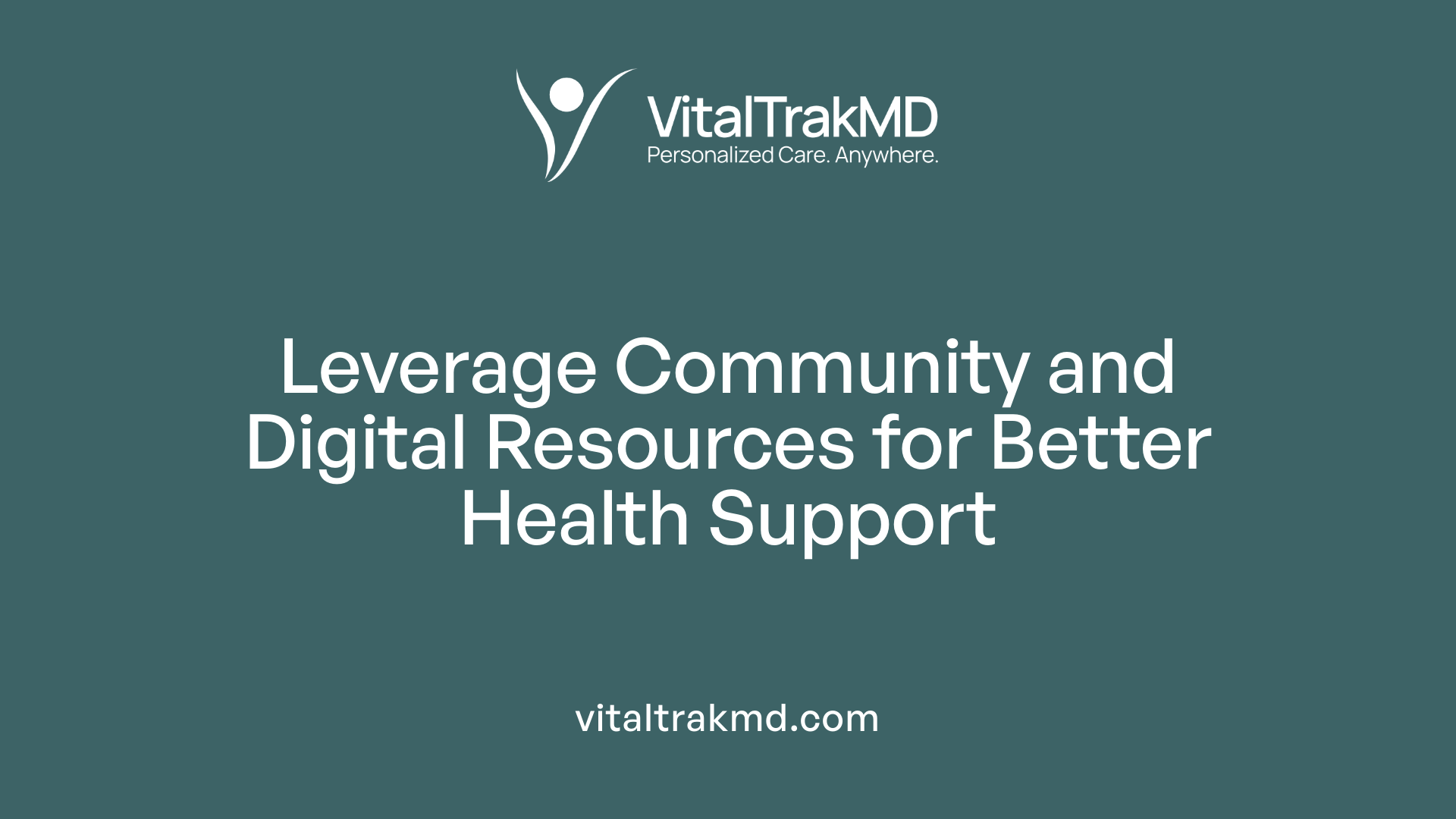Supporting Seniors With Clear Instructions for Daily Wellness

Understanding Holistic Wellness for Seniors
Supporting seniors in maintaining their health and independence requires clear, accessible guidance that encompasses physical, mental, emotional, and social well-being. This comprehensive approach can improve quality of life, reduce health risks, and foster a sense of purpose and engagement among older adults.
The Foundations of Daily Wellness in Seniors
What are some effective ways to support seniors' daily wellness?
Supporting seniors’ daily wellness involves a comprehensive approach that balances physical, mental, and emotional health. Regular physical activity, such as walking, gardening, or gentle stretching, is vital for maintaining strength, balance, and cardiovascular health. A nutritious diet that includes fruits, vegetables, lean proteins, and whole grains helps sustain energy levels and overall bodily functions.
Fostering social connections is equally important. Engaging with family, friends, community groups, or participating in virtual communications like video chats can combat loneliness and boost emotional well-being.
Routine habits play a significant role. Establishing consistent sleep routines and creating comfortable, safe living environments contribute to better sleep and reduce accident risks. Maintaining hydration and eating water-rich foods like fruits and vegetables support bodily functions and cognition.
Preventive care also forms a cornerstone of wellness. Regular health assessments, screenings, and medication checks help identify issues early, allowing timely interventions. Incorporating health apps or telehealth services can facilitate ongoing medical support and connectivity.
In essence, integrating these practices into daily life helps seniors stay independent longer, enhances their overall quality of life, and minimizes health risks. A holistic approach that includes physical movement, nourishing diet, social engagement, and routine health monitoring creates a balanced and sustainable wellness routine for seniors.
Encouraging Physical and Cognitive Activities

What types of suitable exercises can seniors engage in?
Seniors can benefit greatly from regular physical activities that promote strength, balance, and flexibility. Suitable exercises include walking, gentle yoga, swimming, and tai chi. These low-impact activities are easy to adapt to various fitness levels and have proven benefits for cardiovascular health, muscle maintenance, and mental well-being.
How do dancing and gardening enhance seniors' health?
Dancing forms like ballroom, line, or swing dancing are enjoyable ways to improve physical health for seniors. These activities help enhance balance, coordination, and strength while also providing social interaction. Gardening is another excellent activity; it not only encourages physical movement such as digging, planting, and watering but also benefits mental health by reducing stress and fostering a connection with nature. Even indoor gardening with houseplants can provide similar mental health benefits.
What techniques promote mental engagement?
Engaging the mind is essential for cognitive health. Techniques include puzzles, memory games, reading, and participating in group discussions or educational classes. Listening to audiobooks offers an alternative for those with reading difficulties, stimulating the brain and providing entertainment.
How can seniors learn new skills or hobbies?
Learning new skills is invigorating and supports a sense of purpose. Seniors can explore arts and crafts, photography, or even side hobbies like tutoring, blogging, or selling handmade crafts. Many community centers and online platforms offer classes tailored to older adults, making it easier to pick up new interests that also help maintain mental agility.
Practical Tips to Integrate Wellness Activities
Incorporating these activities into daily life can be simple and rewarding. Establishing consistent routines around sleep, meals, and activity times helps foster stability and adherence. For example:
| Practice | Tip | Benefit |
|---|---|---|
| Wake-up & sleep routines | Set a fixed wake-up and bedtime | Improves sleep quality and overall energy |
| Physical activity | Incorporate walking, stretching, gardening | Enhances mobility, balance, and mood |
| Healthy eating | Include fruits, vegetables, lean proteins | Supports immunity and cognitive health |
| Social engagement | Join local clubs or virtual groups | Reduces loneliness and enhances emotional health |
| Mental stimulation | Engage with puzzles, reading, learning | Maintains cognitive function and sense of purpose |
Support from family, friends, and wellness professionals can motivate seniors to stay active and engaged. Small, consistent steps in adopting these habits can lead to meaningful health improvements while helping to sustain independence in everyday life.
More information
For additional tips on promoting physical and mental activity in seniors, searching for "Physical and mental activity tips for seniors" can provide valuable guidance tailored to individual needs and preferences.
Enhancing Emotional and Social Well-being

Role of social interactions
Maintaining strong social connections is vital for seniors' emotional health. Regular interactions with friends, family, and community members can help reduce feelings of loneliness and depression. Participation in social clubs, group activities, or community events provides opportunities for meaningful connections and mental stimulation. Simple actions like scheduled phone calls, emails, and video chats can keep seniors engaged, especially when in-person visits aren't possible.
Volunteering and community service
Volunteering offers seniors a chance to find purpose and stay connected to their communities. Activities like serving at food banks, mentoring youth, or participating in religious community efforts can boost self-esteem and create fulfilling routines. These engagements not only support mental well-being but also promote physical activity and socialization, contributing to a vibrant lifestyle.
Using technology to stay connected
Technology plays a crucial role in fostering social bonds among seniors. Devices such as smartphones, tablets, and computers enable video calls, social media, and access to online groups. Learning to use these tools can expand social networks and provide emotional support. Moreover, health apps and wearable devices help seniors monitor their health and stay motivated for wellness activities. Caregivers can assist in setting up and teaching seniors how to use these technologies, making connections easier and more accessible.
Supporting holistic health practices
Educating seniors about the importance of holistic wellness involves sharing knowledge about the interconnected aspects of health—physical, mental, emotional, and spiritual. Caregivers can promote activities like meditation, yoga, art therapy, or nature walks that address multiple wellness dimensions. Providing access to therapies such as acupuncture, massage, or herbal supplements, while respecting individual values, enhances overall well-being. Encouraging open discussions about spiritual and cultural beliefs further supports a holistic approach.
| Aspect of Wellness | Activities & Examples | Benefits |
|---|---|---|
| Social Connections | Group activities, regular calls, community events | Reduces loneliness, boosts mood |
| Volunteering | Mentoring, community service, religious activities | Provides purpose, promotes social bonds |
| Technology Use | Video chats, health apps, social media | Keeps seniors connected, supports health |
The Importance of a Nutritious Diet and Hydration

Why is hydration important for seniors, and what are other key health habits to promote wellness?
Hydration plays a vital role in maintaining health for seniors. As people age, their bodies undergo changes such as a decreased sense of thirst, lower kidney efficiency, and a reduction in total body water. These factors make older adults more susceptible to dehydration, which can lead to problems like confusion, dizziness, kidney issues, and increased risk of falls.
To stay properly hydrated, seniors should aim to drink around 64 ounces (about 8 cups) of fluids daily, though individual needs can vary based on health and activity levels. Including water-rich foods such as cucumbers, melons, and citrus fruits, along with beverages like herbal teas, milk, and electrolyte drinks, can help meet hydration goals. Caregivers and family members can assist by encouraging regular sips, keeping drinks accessible, and making hydration a routine part of daily life.
Beyond hydration, other health-promoting habits are essential for seniors. Consuming a balanced diet rich in fruits, vegetables, lean proteins, and whole grains supports bodily functions and mental sharpness. Regular physical activity, tailored to individual capabilities, enhances cardiovascular health, muscle strength, and mood. Ensuring good sleep hygiene and engaging in mental activities like puzzles or reading also contribute significantly to overall well-being.
Healthcare providers should regularly monitor health and offer guidance on nutrition and hydration. Implementing these habits can help seniors maintain independence, prevent health issues, and enjoy a better quality of life.
| Aspect | Details | Additional Notes |
|---|---|---|
| Hydration | Aim for about 64 oz daily; include water-rich foods and beverages | Use flavored water or smoothies to encourage intake |
| Salt and Sodium | Limit excess salt intake to prevent dehydration | Focus on fresh, unprocessed foods |
| Diet Composition | Fruits, vegetables, lean proteins, whole grains, healthy fats | Supports immune system, brain health, and energy |
| Water-Rich Foods | Cucumbers, melons, citrus, soups, yogurt | Provide additional hydration and nutrients |
| Tips for Hydration | Regular sips, accessible drinks, flavored options | Make hydration easy and appealing |
Supporting consistent hydration and healthy eating habits helps senior adults stay energized, prevent illness, and maintain their independence for longer.
Creating a Supportive Environment and Using Resources Effectively

What resources are available to help seniors and caregivers implement wellness practices?
A variety of tools and programs are designed to support seniors and their caregivers in maintaining a healthy, active lifestyle. These resources include community-based initiatives, support groups, and online platforms that deliver reliable health information and practical tips for aging well.
National programs such as Move Your Way® and the Physical Activity Guidelines for Americans focus on promoting physical activity. They offer tailored recommendations for older adults, emphasizing activities like walking, swimming, Tai Chi, and yoga. These activities can help improve balance, strength, and emotional health.
Organizations such as the National Council on Aging (NCOA) and its Center for Healthy Aging provide extensive support and resources. They offer training, culturally relevant health solutions, and technical assistance for community health programs. Their tools help with program planning, sustainability, marketing, and increasing participation.
Public health agencies also play a pivotal role by supporting partnerships and offering data-driven resources. These efforts address key issues like nutrition, fall prevention, and managing chronic diseases. For example, federal nutrition programs and local initiatives such as farmers' market coupons help deliver nutritious food options to seniors.
In addition, digital health technologies are expanding options for seniors. Remote monitoring devices, virtual fitness classes, and health management apps enable older adults to take charge of their health from home. These tools help maintain independence while facilitating regular health check-ins and activity tracking.
| Resource Type | Examples | Benefits |
|---|---|---|
| Community Programs | Senior centers, local fitness classes | Social support, physical activity opportunities |
| National Initiatives | Move Your Way®, Physical Activity Guidelines | Tailored activity recommendations |
| Support Organizations | NCOA, Centers for Disease Control and Prevention | Training, health resources |
| Digital Tools | Telehealth, health apps, virtual classes | Accessibility, convenience, personalized health management |
Utilizing these widely available resources can significantly enhance a senior's ability to stay healthy, engaged, and independent. Caregivers also benefit from guidance and support to implement wellness practices effectively.
Supporting senior wellness through awareness and action
To find the most suitable resources, families and seniors can search online with terms like 'Supporting senior wellness resources and programs.' Accessing local health departments, community centers, and national websites ensures updated information on programs tailored for aging populations.
Ultimately, a combination of community engagement, accessible health information, and innovative technology creates a nurturing environment that empowers seniors to thrive physically, mentally, and socially.
Holistic and Personalized Approaches to Wellness

Setting individualized wellness goals
Creating effective wellness routines begins with seniors identifying what matters most to them. Whether it's maintaining mobility, improving sleep, or staying socially engaged, personalized goals help motivate consistent self-care. These goals should be realistic and adaptable as needs change over time.
Developing personalized wellness plans
Once goals are set, developing a customized plan is essential. This includes selecting activities and habits that align with personal preferences and health conditions. For instance, a senior who enjoys gardening might focus on regular outdoor activity, while another might incorporate gentle yoga or cognitive exercises like puzzles.
The plan should also encompass balanced nutrition, hydration, and sleep routines. Incorporating practices like regular health check-ups and using wearable devices or health apps can further support progress.
Involving family and caregivers
Family members and caregivers play a vital role in sustaining wellness efforts. They can provide encouragement, remind seniors about routines, and assist in setting up home modifications or transportation to activities. Involving loved ones fosters a support system that bolsters motivation and accountability.
Engaging caregivers in wellness planning also ensures that all aspects of the senior's health—physical, mental, and emotional—are adequately addressed. Regular communication and shared goal-setting can make the wellness journey more manageable and fulfilling.
| Aspect | Approach | Benefit |
|---|---|---|
| Goal Setting | Personal preferences and health status | Keeps motivation high, realistic outcomes |
| Plan Development | Customized activities and routines | Supports sustainability and enjoyment |
| Family and Caregiver Role | Support, encouragement, and shared planning | Enhances adherence and emotional well-being |
Fostering a holistic, tailored approach to wellness empowers seniors to lead active, independent, and satisfying lives while respecting their individual journeys toward health.
Fostering a Culture of Wellbeing Among Seniors
Creating an environment that prioritizes and supports seniors' wellness through education, resource access, and community involvement not only promotes health and independence but also enhances dignity and life satisfaction. Empowered with clear instructions and ample resources, seniors can embrace aging gracefully, maintaining their vitality, purpose, and joy every day.
References
- 10 Self-Care Activities for Seniors for Health and Happiness
- 12 Essentials To Remember for Senior Wellness
- Tips on Taking a Holistic Approach to Wellness
- Senior Health Hacks: Simple Strategies for Everyday ...
- Hydration for Seniors: Simple Tips to Support Health and ...
- Healthy Aging Tips for the Older Adults in Your Life
- Hydration and older adults: Why water matters more as you ...
- How to Stay Hydrated: A Guide for Older Adults
- Hydration Status in Older Adults: Current Knowledge and ...
Recent articles
Want to Feel Better and Live Healthier?
Join hundreds of patients taking control of their health with personalized care that fits their life – not the other way around.
Rated 4.8/5 by 32+ customers







